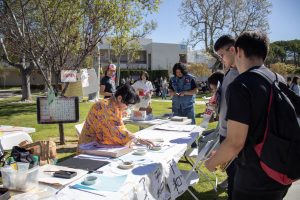Moorpark tax measure postponed by city council
March 27, 2014
In their March 19 meeting, the Moorpark City Council proposed a tax increase to the 2016 ballot, instead of the one later this year.
The council decided they needed more time to inform and persuade the public about the need of such an increase.
The delay is meant to address an issue with wavering public support. Mayor Janice Parvin and some of the council members argued that more time is needed to inform the voters.
“If you structure things right and make sure that the community will have the time to understand and appreciate the value of what you’re trying to do, the voters of Moorpark can be very generous,” said Council member David Pollock.
The poll, conducted by True North Research, showed 54 percent of the population would probably or definitely vote yes on a 25 percent tax increase.
Those in favor of delaying the ballot argued that this number is too low to assure positive results.
“Three or four percent was the margin of error,” said Council member Mark Van Dam. “We were just barely squeaking by that.”
Parvin pointed out many other issues with the poll numbers, such as the difference in polling from official measures. He stated that results would look different on a ballot.
“The questions were very precise, and on a ballot measure it would be written very differently from that,” Parvin said. “[They] were a little bit leading in a positive direction versus what you would see on a ballot.”
The decision to delay this measure was opposed most strongly by Council member Roseann Mikos.
“I think we are missing a golden opportunity in the 2014 elections,” Mikos said.
She pointed out that the council was unprepared largely in part due to the 12 percent cuts to staff, causing a slower-moving city government.
Mikos agrees that the city residents need to be informed and prepared for such a measure, but she is afraid of the council postponing this vote for too long.
“For the last six years at least, we’ve been watching the increase of general funds support . . . and we’ve been saying that we’re going to wait,” Mikos said. “I don’t want the same thing to happen again if we’re not going to go forward.”
Mikos was reluctant to agree that the measure should be postponed, but stressed the importance of a strong public relations campaign to inform the voters of city spending and the necessity of such a tax.
“I understand where people are coming from in the sense of the timing,” Mikos said. “I just want to make sure that we start planning this outreach.”
If approved, the tax would bring in an extra $1.3 million used for general city spending such as road improvements.
The city’s revenue has been steady for years, while spending has increased. This caused the council to use savings for everyday expenses.
The city council is looking to keep a large savings pool for big constructions and renovations, while using a constant revenue stream to account for general upkeep.
“We can’t stop doing things that make a great city,” Mikos said.
After a long debate, the decision passed unanimously and the bill is scheduled to appear on the 2016 ballot.







